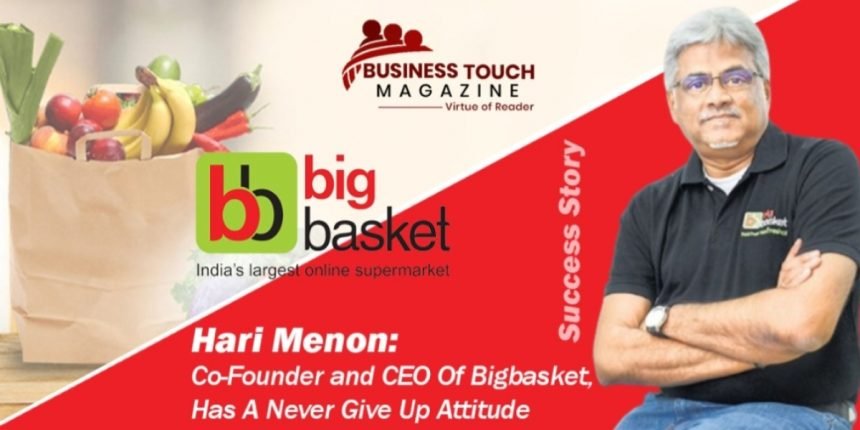Going by the recent stats – the grocery retail market in India is seen to be growing at about 10% CAGR (Compound Annual Growth Rate) and is about $350 Bn in size. Whereas, the online end of this grocery market is expected to be about $10 Bn in the next 4 years. A large portion of the business of this market is likely to be availed from the urban cities.
Hari Menon is one of the most successful entrepreneurs in India today. He is the CEO and co-founder of BigBasket, one of the biggest online grocery stores in India which is headquartered in Bengaluru. A graduate of Bits Pilani, Hari has worked in several companies and gained a lot of experience before he decided to embark on his entrepreneurial journey. Keep reading to find out more about how Menon was able to shift from the corporate world and enter the entrepreneur’s world.
On the other hand, it was not all that easy for Menon! It is through his fighting spirit and ‘Never give up attitude that he has come so far. He has seen failures also. Finally, the man with vision has proven himself and at the same time, earned a name. Beginning in the corporate world, he has entered the world of entrepreneurship but his experience and expertise gained after working in many companies, have shown everyone that passion and hard work do not get wasted.
Through this first online platform selling groceries in India (BigBasket), Menon changed the way groceries were bought previously.
Initial Journey of Hari Menon
Hari Menon was born in 1996 in Bandra West, Mumbai. His family was a middle-class family. From his early days of childhood, he is inclined toward Music and Cricket. Likewise other middle-class parents, his parents also guided him to focus on studies more to have a stable career in life. However, he possessed a mind of an experimentalist. His eagerness to trial run grew with time. He completed his engineering degree from one of the top institutions in India, BITS Pilani. He also owns a degree in MBA from Carnegie Mellon University. He was the country head of Planet Asia, among the first Internet services businesses in India.
Later, he joined Wipro, an Indian Multinational Corporation, as a Business Head of the Infotech business. Following his passion, he also served ‘India skills”- the Vocational Education Joint Venture, as the CEO. He is a member of the Karnataka Cricket Association. He and his colleague launched fabmart, which was India’s first online store, in 1999. But it failed due to many reasons like the unavailability of a secure digital payment gateway etc. They also set up a chain of physical stores called Fab mall, which was sold to Aditya Birla Group in 2006.
Big Basket Founders
1. Hari Menon
Hari Menon is the co-founder and CEO of Big Basket. He was a former CEO of Symphoni Industrial AI, Timeli, Serus Corporation, and Tumri and pursued his MBA from Carnegie Mellon University.
2. Vipul Parekh
Vipul Parekh is the Co-founder of Fabmall and the former director of companies such as Peepul Capital- a leading private equity fund. Besides, he has also worked as a business development head at the Wipro InfoTech Group, he is a former alumnus of IIM Bangalore.
3. VS Sudhakar
VS Sudhakar is also the CEO of Big Basket and was the former CEO of Planetasia and has great experience in the IT sector.
4. VS Ramesh
VS Ramesh is the Head of Supply Chain and Logistics at Big Basket. He has over 21 years of experience in operations and logistics and graduated from Karnataka University in Electronics Engineering.
5. Abhinay Choudhari
Abhinay Choudhari is the head of New Initiatives at Big Basket. He was a former employee at iGATE and Infosys. He was the founder of www.stylecountry.com and is a former alumnus of IIM Ahmadabad.
BigBasket Inception
BigBasket was co-founded by Abhinay Choudhari, Hari Menon, Vipul Parekh, and VS Sudhakar in October 2011. The platform is currently India’s largest online supermarket and delivers the entire range of groceries. They have a wide range of household products in around twenty-five cities in India. But the success didn’t come easy. During the initial days of operation, the only form of advertising they were able to do was through word of mouth and their biggest challenge was to maintain a capacity and build a customer demand.
Soon the startup saw a new light and was able to gain a growth rate of 25%-30% along with 60%-70% of customers returning per month to repurchase groceries. They were able to do this due to their strong dedication and hard work toward achieving their dreams. Menon was convinced to make this startup work and build strong strategies revolving around customer satisfaction and ensured a good quality of products and service to attract them and encourage them to spread the word about the startup.
By the end of Fiscal Year (financial year) 2013 – BigBasket was closing 2,000-2,500 orders a day, or 75,000-80,000 orders a month, with an average monthly ticket size of ₹1500/per order. They were now a 600-strong team across three cities and were drawing roughly ₹20 crores from Bangalore itself. These numbers further increased in 2014. They had now crossed Million orders being delivered and had also expanded their team to 1000 people, who were now handling more than 200,000 customers spread across three cities, with 5000 orders a day.
Most of the new customers came through referrals which showed that the customers were satisfied with their service and were spreading word-of-mouth. And soon his efforts resulted in the new momentum, and the startup was able to secure its first funding of about $10 Million from ChrysCapital and Ascent Capital.
Business Model of BigBasket
BigBasket has effectively managed to attain and maintain its success by using various strategies which mainly surround three important factors: –
- Unmatchable Customer Service (in all aspects)
- A large variety of products
- A constant innovation using technology
Now the grocery business in India is mainly divided into two types i.e., Planned Purchases and Top-up Purchase. The names themselves are enough to explain what they mean, and need no description. BigBasket has designed its strategies and model, to cater to both the categories swiftly.
When BigBasket started its operations, it adopted the ‘just-in-time model’ – wherein not only perishable goods but every item was brought against an order. In other words, they were purchased to order. In this model, the delivery boy directly picks up the item from the vendor and directly delivers it to the customer. They still use this model for quite-a-few items like Bakery items, Pet food, Small household appliances, etc. which are not feasible to store.
Over the period, as their business grew, they moved on to an ‘inventory model’ (for most of its products), and BigBasket now buys products directly from suppliers like – HUL, P&G, farmers, mills, etc and then stocks these in warehouses. BigBasket then adds a margin to the purchased price of the product before selling them.
Big Basket Acquisitions & Mergers
| Date | Acquired |
| March 24, 2020October 19, 2018October 19, 2018October 18, 2018June 12, 2015 | Daily NinjaMorning CartKWIK 24RaincanDelyver |
The BigBasket Timeline
- 2011: Launches in Bangalore
- 2015: Ropes in actor Shah Rukh Khan as brand ambassador
- 2016: Expands to 8 major Indian cities
- 2019: $150 million in investments received from Mirae, Alibaba Group and CDC
- 2020: Acquisition of micro-delivery firm DailyNinja, 5 million registered customers, expands to 26 cities
- 2021: Tata Digital buys 64% stake in BigBaske
Awards & Recognition
- Consumer Internet Company of the Year, VC Circle 2016
- Best Online Grocer, Coca Cola Golden Spoon Awards, 2016
- Best Retail and E-commerce App of the Year, AWS Mobility Awards, 2017
Message for Entrepreneurs from Menon’s Story
As previously stated, Menon is the kind of person who never gives up. He has always pushed himself to learn and do better and continues to do so. During the initial days of BigBasket, he had set up a training and innovation function to increase the skills of his labour force and make sure that the customers were satisfied. This was one of the main reasons for the success of BigBasket.
Menon continues to put the customers at the front and develops strategies around them. According to him, the customers are the most important stakeholders of a business, especially a one like BigBasket and so transparency and communication with them are extremely important. Along with the customers, he also concentrates on his employees. Menon is truly the epitome of inspiration and his passion to keep going and never give up is something that all entrepreneurs should adapt to in today’s world if they want to be successful.




